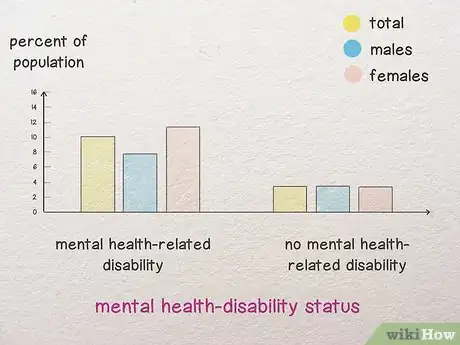This article was co-authored by wikiHow Staff. Our trained team of editors and researchers validate articles for accuracy and comprehensiveness. wikiHow's Content Management Team carefully monitors the work from our editorial staff to ensure that each article is backed by trusted research and meets our high quality standards.
There are 8 references cited in this article, which can be found at the bottom of the page.
This article has been viewed 14,787 times.
Learn more...
Studying psychology is a great way to gain insight into the human condition and understand those around you. To succeed in psych class, take careful notes, participate in studies, and prepare for exams with study groups. You can also learn about psychology on your own with books and videos. Who knows, you may be inspired to become a psychologist!
Steps
Succeeding in Psych Class
-
1Take detailed notes during class lectures. Even if your teacher or professor posts lecture notes online, the physical act of taking notes will make the concepts stick better. It will also force you to pay attention. Try not to just copy what the professor has written on the board, but also write down important things spoken in lecture. Whenever your professor starts a new topic, mark a new section in your notes and write down some key points.[1]
- Studies have shown that taking notes by hand is more conducive to learning than taking notes by computer.
- Don’t feel the need to write down every word your professor says.
-
2Make note of the key points in the readings. Reading your psychology textbook isn’t like reading a novel. You have to actively take notes or you may not remember what you've learned. Write down the chapter headings and then make a few bullet points for each one with key information. If you’re not sure what is the most important information to write down, check out the textbook chapter summary, which will often include only the most important points.[2]
- Some textbooks will also mark the most important information in bold, or have review sections going over key points.
Advertisement -
3Participate in psych studies. Most universities require undergraduates in their introductory psychology classes to participate in psychology studies. It’s an easy way for psychology departments to get participants for their studies, but it can also be an interesting learning experience for you to see how a real psychological study is conducted.[3]
- To participate, you’ll probably have to go to your university’s psychology department, and fill out a survey, play a game under observation, or interact with other study participants in a different way.
- Psychology studies often don’t tell you what they’re actually studying so that you don’t change your behavior.
- Only participate in studies that respect your rights and make you feel comfortable.
- Avoid participating in really grueling psychological studies only to make money. There are other ways to make money on campus that are much less hard on you, like tutoring, working in the dining hall, or working in the library.
-
4Avoid diagnosing yourself. With all your newfound psychological knowledge, you may be tempted to diagnose everybody you meet with some sort of disorder. You may even find yourself worrying that you have some disorders yourself. Don’t worry! This is a perfectly normal reaction, common among psychology students and medical students. You’re not sick, you’ve just learned so much information that you start seeing symptoms when they aren’t actually there.[4]
- If you’re really worried, talk to a therapist. They can let you know whether what you’re experiencing is actually something to worry about, or if you’re just worried.
Preparing for Exams
-
1Start studying for exams at least a week in advance. This gives you time to gradually prepare, instead of cramming last minute. Plan to study for about an hour or two every day for a week. By the day of the exam, you will have absorbed all the material you need to ace your test.[5]
- This is a much better strategy than trying to cram in all the information the night before the exam, which will be super stressful, exhausting, and not very effective.
-
2Study with a range of techniques. Read through your notes from the whole course. Complete practice quizzes, if you have them, or go over questions from the midterm that you didn’t get right. Make yourself flashcards with key things you have to memorize and test yourself when you have spare chunks of time, like during your commute.[6]
- Try applying the concepts to real life. If you’re learning about a particular behavior in psychology, take note of real-life times when it occurs. This will make it much easier to remember, and much more interesting!
-
3Study in 45-minute chunks. Set a timer on your phone to work for 45 minutes, and make sure you don’t surf the internet or message anybody for those minutes. Then, take a 5-minute break to walk around, do a few push-ups, chat with a friend, or take care of any other needs.[7]
- Recharging every 45 minutes will help you keep studying, and it’s unsustainable to expect yourself to focus for hours on end with no breaks.
-
4Make charts comparing different psychological effects or disorders. Make a chart where one side is a list of psychological concepts, and the other side is a list of modifiers. Modifiers could include: what it is, what makes it increase, why it happens, relevant studies, and real-life examples.[8]
- The act of physically writing the information down in the chart will help you remember it, and contrasting different concepts will help see the big picture and make broader comparisons.
-
5Review with a group. While it’s important to spend time studying on your own, you should also study with a group. Make it a fun occasion by inviting friends in your class to bring a potluck of snacks, so you can all munch on something as you study. You can quiz each other on the material, and work through any questions you have out loud, instead of going in circles in your head.[9]
- Studying with a group makes studying much more fun. You can make up silly acronyms for remembering concepts, or put on some music to lighten the mood.
- Make sure to also make time to study by yourself, because groups can get distracting, especially if you’re all friends.
-
6Get enough sleep the night before the exam. While it may be tempting to stay up all night cramming psychology concepts, this will only make you feel tired and stressed for your big exam. Trust that you’ve put in plenty of hard work the last week or two and that you’ve learned enough. Now what you need to succeed is a good night’s sleep.[10]
- If you really want to cram right before the exam, you can look at some flashcards with key concepts, but most of the real work of studying is behind you at this point.
Studying Psychology on Your Own
-
1Take the college-level class Introduction to Psychology on Coursera. Coursera is an online teaching platform that offers college-level courses for free. Universities including Yale and the University of Toronto offers Introduction to Psychology courses on Coursera. The courses typically last 10 weeks and include weekly video lessons and online quizzes.
- If you take the class for free, you can’t get college credit for it, but if you want to you can pay for a certificate of completion, which some colleges accept for credit.
-
2Check out Khan Academy's online psychology courses for children. Khan Academy is a nonprofit that offers free online lessons in many subjects, geared toward children. Check out their introduction to psychology course, where you can learn at your own pace with videos and other forms of lessons.[11]
- Some schools offer class credit for Khan Academy courses.
-
3Watch the Crash Course Psychology videos for a basic introduction. Hank Green, brother of the author John Green, offers funny, educational video courses on YouTube. The psychology course videos are meant for high-school level students and are based on the AP Psychology curriculum, but you can take it when you’re older or younger than high school if you’d like.[12]
- If you’re taking AP Psychology in school, Crash Course is a great way to review before the AP exam.
-
4Read popular psychology books to learn more. Read Nobel Laureate Daniel Kahnemann’s Thinking, Fast and Slow to learn how behavioral psychology influences people. Check out The Social Animal by Eliot Aronson to learn about social psychology. Go for The Man Who Mistook his Wife for a Hat by Oliver Sacks for a collection of interesting anecdotes from clinical psychology.[13]
- Many bookstores and libraries have psychology sections that you can browse for inspiration.
-
5Review psychology journals to stay on top of new developments. There are many psychology journals available online that detail various syndromes, treatments, and clinical experiences. Check out the American Psychological Association website to find a range of articles and databases (https://www.apa.org/).
References
- ↑ http://labs.psychology.illinois.edu/~lyubansk/Therapy/Tips.htm
- ↑ http://cornellpsych.net/studytips
- ↑ https://psychcentral.com/blog/how-to-succeed-in-psychology-class/
- ↑ https://www.psychologytoday.com/us/blog/in-excess/201609/brief-look-medical-student-syndrome
- ↑ https://www.princetonreview.com/college-advice/how-to-study-for-finals
- ↑ https://www.princetonreview.com/college-advice/how-to-study-for-finals
- ↑ http://labs.psychology.illinois.edu/~lyubansk/Therapy/Tips.htm
- ↑ http://labs.psychology.illinois.edu/~lyubansk/Therapy/Tips.htm
- ↑ https://www.princetonreview.com/college-advice/how-to-study-for-finals
- ↑ https://www.princetonreview.com/college-advice/how-to-study-for-finals
- ↑ https://www.khanacademy.org/science/health-and-medicine/mental-health/depression-and-related-disorders/v/introduction-to-psychology-depression-and-major-depressive-disorder
- ↑ https://www.youtube.com/playlist?list=PL8dPuuaLjXtOPRKzVLY0jJY-uHOH9KVU6
- ↑ https://www.sparringmind.com/psychology-books/










































































